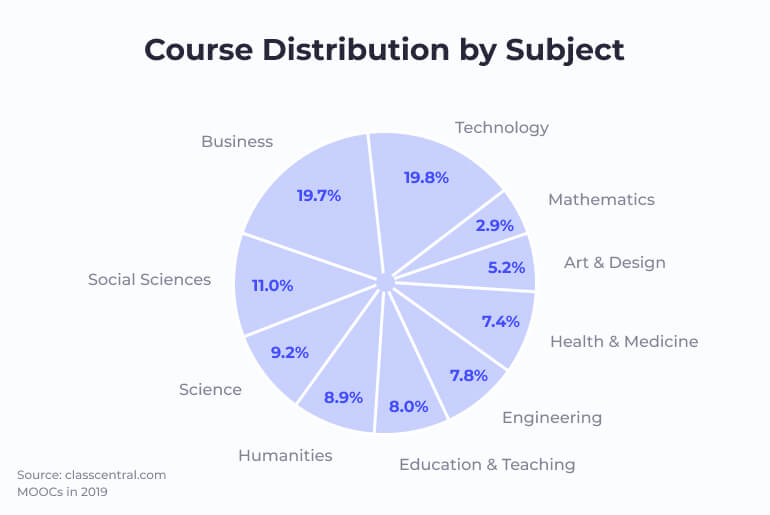Things in the education space have a tendency to evolve rapidly, making it feel like the world keeps changing overnight. Students today find themselves with a genuine concern about staying ‘future-proof’, or being able to keep up with such changes to remain competitive as they enter the workforce.
These changes won’t stop, so what can students like you do to keep up?
One way that’s quickly gaining momentum is the pursuit of ‘micro-credentials’. Think of it this way: a typical college degree takes four years to finish. Some of what you learn will be useful for your career, but maybe not all of it. Either way, at the end of that time, you’ll earn a ‘macro’ credential like a Bachelor’s or Master’s Degree as proof that you have the knowledge and skills you need.
Earning a ‘micro-credential’ is different. Firstly, you get to pick and choose the exact things you want to learn and leave out the ones that you don’t. As soon as you’ve proven you know enough, you’ll get your reward. Typically, these rewards come in the form of digital badges for you to show to employers on your online profiles and résumés. Getting microcredentials costs less than earning a traditional certificate, and you can complete it as quickly or as slowly as you can manage.
Are Micro-Credentials Common?
When micro-credentials first appeared, it wasn’t the traditional institutions that were championing them. Interestingly, it was the non-traditional education platforms like Udacity, edX and others that made them known. These providers had different names for their micro-credentials, like Udacity’s ‘Nanodegree’, edX’s ‘MicroMasters’, and Coursera’s ‘MasterTrack’ certificates.
These micro-credential providers can move quicker than traditional institutions to design and deliver courses that students need. Their courses cover traditional subjects like Business and Accounting, and also futuristic topics like Artificial Intelligence and Machine Learning.
 That ability to move quickly has made these companies grow amazingly fast. In 2018, Udacity, for example, already had more than 50,000 Nanodegree students, 27,000 of whom had already graduated. This is impressive considering Udacity only launched the program 3 years before!
That ability to move quickly has made these companies grow amazingly fast. In 2018, Udacity, for example, already had more than 50,000 Nanodegree students, 27,000 of whom had already graduated. This is impressive considering Udacity only launched the program 3 years before!
Recently, Business Insider published an article about the 13 most popular online courses, all of which awarded a micro-credential upon completion. Which subject topped the list? Machine Learning, with more than 2.7 million students enrolled for the subject through Coursera. As expected, traditional subjects like Marketing and Project Planning also made the list. But it wasn’t just all about those kinds of courses. Some of the most popular courses on the list taught life and business skills instead. Among the top 13 courses, Negotiation Skills and Psychological First Aid had 594,000 and 97,000 enrollments respectively.
With all of this said, do you think that these courses are only popular in certain countries? Think again! Micro-credentials are also being taken seriously in other parts of the world. All the way in Southeast Asia, for example, the Malaysian government has even created official micro-credential guidelines for their colleges and universities.
What this means for students like you is that micro-credentials will eventually be valuable everywhere you go!
A Great Way For You To Fill A Skill Gap
Micro-credentials aren’t just valuable while you’re a student. Once you’re working, you can stay future-proof by getting new digital badges or degrees to upskill yourself at any time!
In the past, upskilling often meant taking a part-time course that interrupted your life and career. With micro-credentials, working adults could stay at their jobs and learn whenever they wanted to.
Micro-credential providers understand this, so they tend to collaborate with industry leaders to understand and cater to the needs of working adults. Udacity, for example, works closely with companies like Google, AT&T, Salesforce and even Facebook to ensure that their courses fit the needs of adults already in the workforce.
What Do Employers Have To Say About Nano Degrees?
Students and working adults aren’t the only ones that win with micro-credentials. According to an interview with Jonathan Finkelstein, founder and CEO of Credly, workers bring what he calls their ‘portable and verifiable credentials’ from job to job.
[su_youtube_advanced url=”https://youtu.be/_Ab1hGRYYNU” rel=”no”]
This allows employers to figure out where the best talent comes from. When employers know which micro-credentials to look for, they can then find the talent they need much more efficiently.
So, this ends up being a win-win-win situation for students, working adults and companies alike!
How Students Are Already Winning With Micro-Credentials
Despite having been around for less than a decade, the use of micro-credentials is already spreading globally. Places like The State University of New York (SUNY) in the U.S., The University of Melbourne in Australia, and the University of Science, Malaysia (USM) are already actively involved with micro-credentials.
They all tend to work the same. If you already have unique skills or knowledge in a particular area, you can have them recognized by earning digital badges to represent them. Or, if you want to learn something new, you can get micro-credentials in subjects that complement your other qualifications.
So how does all of this make a student like you ‘future-proof’?
It’s simple: Whenever there’s something you don’t know, you can pursue a quick course and earn a micro-credential at any point in time. Best of all, you won’t have to interrupt your education or career to do so!
Are Micro-Credentials Legit, Or Is This Just A Fad?
As a student, it would be fair for you to ask if micro-credentials are worth your time, or if all of this is just a passing fad. Right now, everything seems to point to micro-credentials being here to stay and even becoming more popular with time.
Just like any academic pursuit, there are downsides. The quest for micro-credentials does require some of your time and money. Also, you might not find some micro-credentials particularly useful for your career later on.
However, the pros outweigh the cons.
Many students and workers worry about having the right knowledge and skills to stay competitive and remain employable. Micro-credentials give them what they need quickly and affordably. The low financial cost is especially true because courses allow students to make use of free learning tools like e-books for studying and plagiarism checkers for any written coursework.
For many students, having micro-credentials can also be an advantage when pursuing competitive internships. On job profiles, two fresh graduates from the same university might look the same. But with the right digital badges, you’ll be able to stand out much more and show employers why you’re the better candidate!
Where Do You Go To Get Nano Degrees?
You could get started with micro-credentials right now! Your first option is to check with your college or university to see if they have a micro-credentialing program of their own. Whether they do or not, you can also use the many online providers that are recognized all over the world.
Udacity is probably one of the most popular ones. But you also have great options with Udemy and Coursera as well. These are big names in micro-credentials that have earned a lot of trust and legitimacy. Check them out, and you’ll definitely find something you’d love to learn.
The topic of micro-credentials, just like anything else in the education space, tends to evolve quickly. To be on top of these changes, subscribe to the Unicheck blog so you’ll get updates before anyone else.




